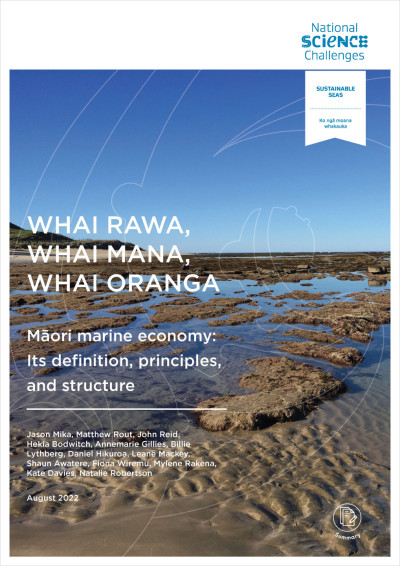- Summary
Māori marine economy: Its definition, principles, and structure
This paper defines the Māori marine economy, outlines its structure, and highlights challenges for Māori marine-based enterprises engaged in the business of fishing. It draws together findings from a literature review of traditional and contemporary knowledge, values, principles and practices; case studies of Māori marine-based enterprises; and an institutional analysis of the Māori marine economy.
Whai rawa, whai mana, whai oranga – elaborates on the Māori marine economy’s historical and contemporary basis. This 24-page research summary booklet creates an accessible introductory platform to more clearly understand where we are now in the blue economy for Aotearoa, and how this came to be. Simple descriptions are provided for relevant values and principles within mātauranga and tikanga Māori, such as kaitiakitanga, tapu and noa, mana and utu, and Mana Moana.

In the research, the team found that:
- The Māori marine economy traditionally centred around whānau and hapū occupation, use, and management of fishing grounds under the leadership of rangatira, according to tikanga Māori practices of management, sharing and reciprocal exchange.
- The mātauranga or knowledge associated with management, protection, and use of the marine environment and its resources that had been refined through generations of experience as tāngata whenua was diminished through the process of colonisation.
- Māori control of the marine economy, its fishing grounds, and other resources, was gradually lost as, under settler state law, inshore fisheries were a common good, with almost unlimited open access. Māori could not compete with the growing industrialisation and internationalisation of the fishing sector and were ultimately deprived of the opportunity to sustain themselves economically, socially, and culturally through the marine economy.
- The introduction of the quota management system, which effectively privatised this common good, was resisted because it did not recognise Māori rights and interests under the Treaty of Waitangi. The Waitangi Tribunal finding that Māori retained unextinguished ownership of the marine economy forced the government to negotiate with Māori. The subsequent Treaty of Waitangi settlement of Māori fisheries has sought to restore Māori customary fishing rights and facilitate Māori back into the business of fishing, but under the new regime.
- Māori ownership of quota is concentrated within iwi and pan-iwi ownership of Moana New Zealand and a 50% stake in Sealord. Māori marine-based enterprises are, nonetheless, investing in recreating and applying kaitiaki-centred business models at whānau, hapū, and iwi scales to provide for the wellbeing and wealth of their communities. An institutional map shows the Māori marine economy has much potential, but it is constrained by regulatory institutions that sit outside direct Māori control and influence.
A current research project - Indigenising the blue economy, is building on these findings, to examine the blue economy in Aotearoa at the enterprise level and the political and economic institutions within which the Māori marine economy is governed and managed.
Research team:
Jason Mika, Matthew Rout, John Reid, Hekia Bodwitch, Annemarie Gillies, Billie Lythberg, Daniel Hikuroa, Leane Mackey, Shaun Awatere, Fiona Wiremu, Mylene Rakena, Kate Davies, Natalie Robertson
Related News:
Towards an Indigenous blue economy – an interview with Dr Jason Mika. The Context: Asia-Pacific. August 2022
A conversation about the future with Dr Shaun Awatere. 'Conversations about the future' is a set of interviews about demographics, climate change and their implications, conducted from December 2019 - February 2020 with selected Māori and Pacific leaders and experts by Treasury Chief Economic Adviser Tim Ng.
The Treasury, Te Tai Ōhanga, Feb 2020